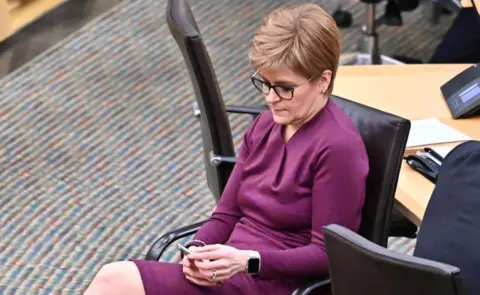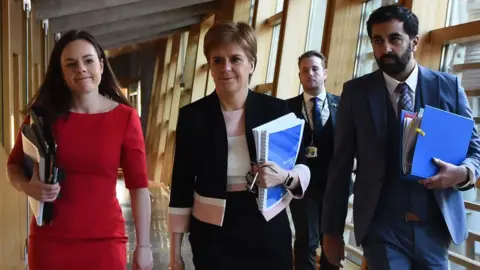Was Sturgeon just following WhatsApp guidelines by hitting delete?
 Getty Images
Getty ImagesQuestions about Scottish government WhatsApps from the pandemic era have rumbled on for months.
There have been claims that some messages were handed over too slowly, and even accusations of exchanges being deleted.
Right now, the figure in the spotlight is Nicola Sturgeon.
Last week the counsel to the UK Covid Inquiry said the former first minister appeared to "have retained no messages whatsoever" from the pandemic.
In a statement issued yesterday, Nicola Sturgeon said messages communicated through "informal means" were handed to the inquiry last year.
She conceded that messages had not been "retained" on her own device, but said she had obtained copies which she'd passed over.
Ms Sturgeon stressed that she acted in line with Scottish government policy.
This has prompted some to ask how guidance can have been followed if messages were not kept on the former first minister's phone.
Here things get a bit complicated. Government guidelines in this area are complex.
The Scottish government brought in new mobile messaging guidance in November 2021 - in the midst of the pandemic. This spells out how ministers should approach informal messaging systems, such as WhatsApp.
Officials and ministers are allowed to use these apps to conduct business, with the guidance stating "you must transcribe the salient points of any business discussions and/or decisions in a mobile messaging app into an email or text document". This should then be saved centrally.
In other words, you can make decisions and have government discussions on WhatsApp, provided you then copy that information and save it.
This will then be stored exactly as official minutes, records etc would be. Crucially, it will be accessible to the public under Freedom of Information laws.
Once this has all been done, the guidance states "you must delete business conversations in the mobile messaging app".
So the Scottish government policy therefore actively encourages the deletion of conversations on apps like WhatsApp.
 Getty Images
Getty ImagesThe thinking is that the relevant information has now been saved centrally, and so it's safe to get rid of the original conversation.
What's the logic here? Well, bearing in mind phones can be lost or stolen, you could make the argument that it's sensible to regularly clear them of government conversations.
This potentially explains how Nicola Sturgeon can say she hasn't retained messages on her own device, but was able to submit "copies" to the inquiry.
This could also explain her statement - issued on social media yesterday - that she has always "acted in line with Scottish government policy".
Though there are still important questions to be asked about all of this.
Why does there appear to be a difference in how ministers have approached retaining messages? Humza Yousaf insists he kept all of his from the pandemic. As does the former Finance Secretary Kate Forbes.
The explanation for this may be that this guidance is… guidance. It's not hard and fast rules, and therefore some ministers may have taken a different approach.
Digital wastebasket
Many will also question guidance that essentially allows ministers and officials to mark their own homework.
After all, it looks like it's left up to them to determine which messages are relevant and should be saved for posterity, and which should be chucked into a digital wastebasket, never to be seen again.
And some would say that a looming public inquiry should have led to all ministers keeping everything on their phones intact.
As this guidance is put under the spotlight, it's likely that opposition politicians will question how fit for purpose it is.
When it comes to how civil servants and ministers interpreted all of this, and how assiduously they followed it, that's something known only to each individual.
Nicola Sturgeon will get the opportunity to spell all of this out when she appears in front of the UK Covid Inquiry in the coming weeks.
